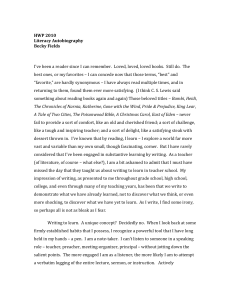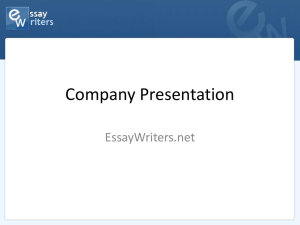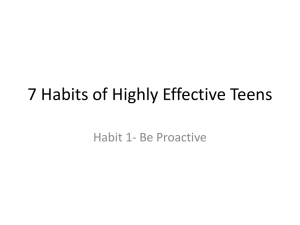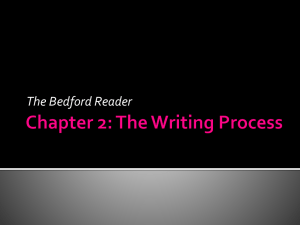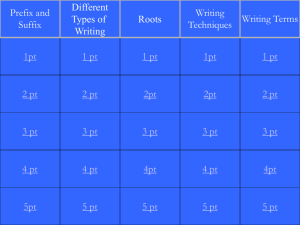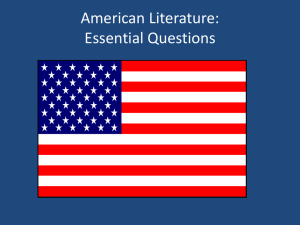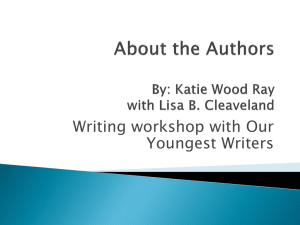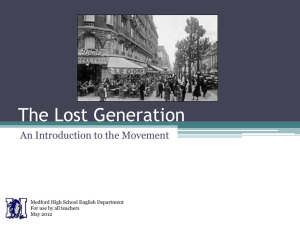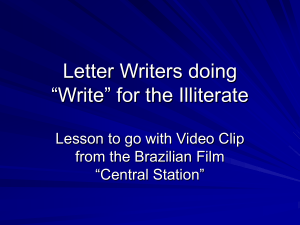Session 2: Using our Work in Reading Characters to help us Read
advertisement
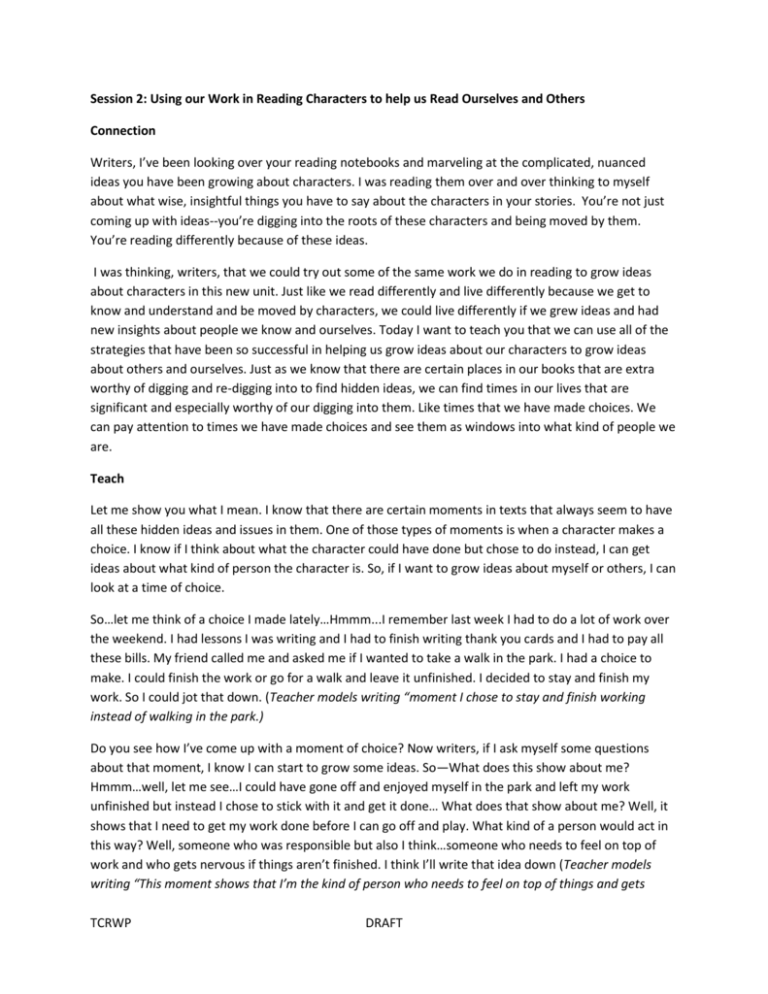
Session 2: Using our Work in Reading Characters to help us Read Ourselves and Others Connection Writers, I’ve been looking over your reading notebooks and marveling at the complicated, nuanced ideas you have been growing about characters. I was reading them over and over thinking to myself about what wise, insightful things you have to say about the characters in your stories. You’re not just coming up with ideas--you’re digging into the roots of these characters and being moved by them. You’re reading differently because of these ideas. I was thinking, writers, that we could try out some of the same work we do in reading to grow ideas about characters in this new unit. Just like we read differently and live differently because we get to know and understand and be moved by characters, we could live differently if we grew ideas and had new insights about people we know and ourselves. Today I want to teach you that we can use all of the strategies that have been so successful in helping us grow ideas about our characters to grow ideas about others and ourselves. Just as we know that there are certain places in our books that are extra worthy of digging and re-digging into to find hidden ideas, we can find times in our lives that are significant and especially worthy of our digging into them. Like times that we have made choices. We can pay attention to times we have made choices and see them as windows into what kind of people we are. Teach Let me show you what I mean. I know that there are certain moments in texts that always seem to have all these hidden ideas and issues in them. One of those types of moments is when a character makes a choice. I know if I think about what the character could have done but chose to do instead, I can get ideas about what kind of person the character is. So, if I want to grow ideas about myself or others, I can look at a time of choice. So…let me think of a choice I made lately…Hmmm...I remember last week I had to do a lot of work over the weekend. I had lessons I was writing and I had to finish writing thank you cards and I had to pay all these bills. My friend called me and asked me if I wanted to take a walk in the park. I had a choice to make. I could finish the work or go for a walk and leave it unfinished. I decided to stay and finish my work. So I could jot that down. (Teacher models writing “moment I chose to stay and finish working instead of walking in the park.) Do you see how I’ve come up with a moment of choice? Now writers, if I ask myself some questions about that moment, I know I can start to grow some ideas. So—What does this show about me? Hmmm…well, let me see…I could have gone off and enjoyed myself in the park and left my work unfinished but instead I chose to stick with it and get it done… What does that show about me? Well, it shows that I need to get my work done before I can go off and play. What kind of a person would act in this way? Well, someone who was responsible but also I think…someone who needs to feel on top of work and who gets nervous if things aren’t finished. I think I’ll write that idea down (Teacher models writing “This moment shows that I’m the kind of person who needs to feel on top of things and gets TCRWP DRAFT nervous if things aren’t finished. In other words, I can’t relax if I have something to do hanging over my head…) Writers, did you see the way I came up with a moment of choice, asked myself some questions about that moment to grow an idea quickly then jotted the idea down and started to write long about it? I could keep going with that entry. I could write fast and furiously for a whole page or more all about my idea about how I need to feel on top of everything and get nervous if I didn’t do something. I’ll do that later. Right now I want you to try this out. Active Involvement Right now I want you to think of a choice you have made recently. Try to think of a choice that mattered like whether to do something or whether not to do something. Put a thumbs up when you’ve thought of a moment. Okay, Partner 2 you are going to tell your moment of choice to your partner and Partner 1 you are going to ask Partner 2 questions about the moment like I asked myself to help Partner 2 grow an idea about himself/herself. (Teacher points to yesterday’s chart with possible questions to ask.) Okay, turn and talk. Writers, I’m hearing that you are all starting to come to such interesting and insightful ideas about yourself. Karen told Mark that when she had to choose to go to her grandma’s house for dinner or her friend’s sleepover, she chose to go to her grandma’s and that made her realize that she is the kind of person who values her time with family. And Jesse said that he had to choose to go to his dad’s for the weekend or to a soccer game his friend invited him to. And he said he chose to go to his dad’s but he was angry about it which made him think that he is the kind of person who doesn’t want to hurt his dad but has trouble telling him what he really wants. Wow. I am blown away by the ideas you are already starting to grow about yourselves. Link Remember, just like we want to be the kinds of readers who think and care deeply about characters to gain insights, we want to be the kinds of people who look at what we and others do and have nuanced, complex ideas about these actions. We want to be the kind of people who can read others and who know ourselves well. We’re going to do everything we know about growing ideas to help us. Remembering a moment of choice and thinking about that choice as a window into what kind of person someone is can help you grow ideas. You have lots of other strategies as well. Think of ones you’ve used to grow ideas about characters that were successful for you and try out that strategy to come up with material that will lead you to this new kind of writing. I’ll even put up our chart “Ways we Grow Ideas about Characters” so we can use that if it’s helpful. Conferring/Small Group Work TCRWP DRAFT -growing ideas about our emotional settings -Start with an idea and move to small moments Mid-workshop teaching point- Mid-Workshop Teaching Point: Our Objects and Possessions can Reveal our Character We know that objects and possessions of characters in stories can reveal what kind of people they are. Today I want to remind you that the objects and possessions that we keep and that other people keep can also reveal our characters, our personalities and who we truly are. You are working so hard to grow ideas, writers. I see many of you using the strategies from our old charts and I want to compliment you on making use of all you know about growing ideas. Today will you try out a different strategy on a chart that you haven’t used yet or will you pay attention to see if there are new strategies that you are using that are not on our charts? What is working best for you? Teaching Share Writers, I want to share with you some work that Karen has done. She has said that she knows paying attention to the minor characters in stories and looking at how they influence the major character always pays off to grow ideas. So she’s been looking at her relationships with different people in her life and asking herself what that says about who she is. What a great strategy! I’ll add that to our chart. Will you think now about what strategies you’ve been using to grow ideas? What have been the most successful for you? Have you tried new ones? Turn and talk to a partner. TCRWP DRAFT

